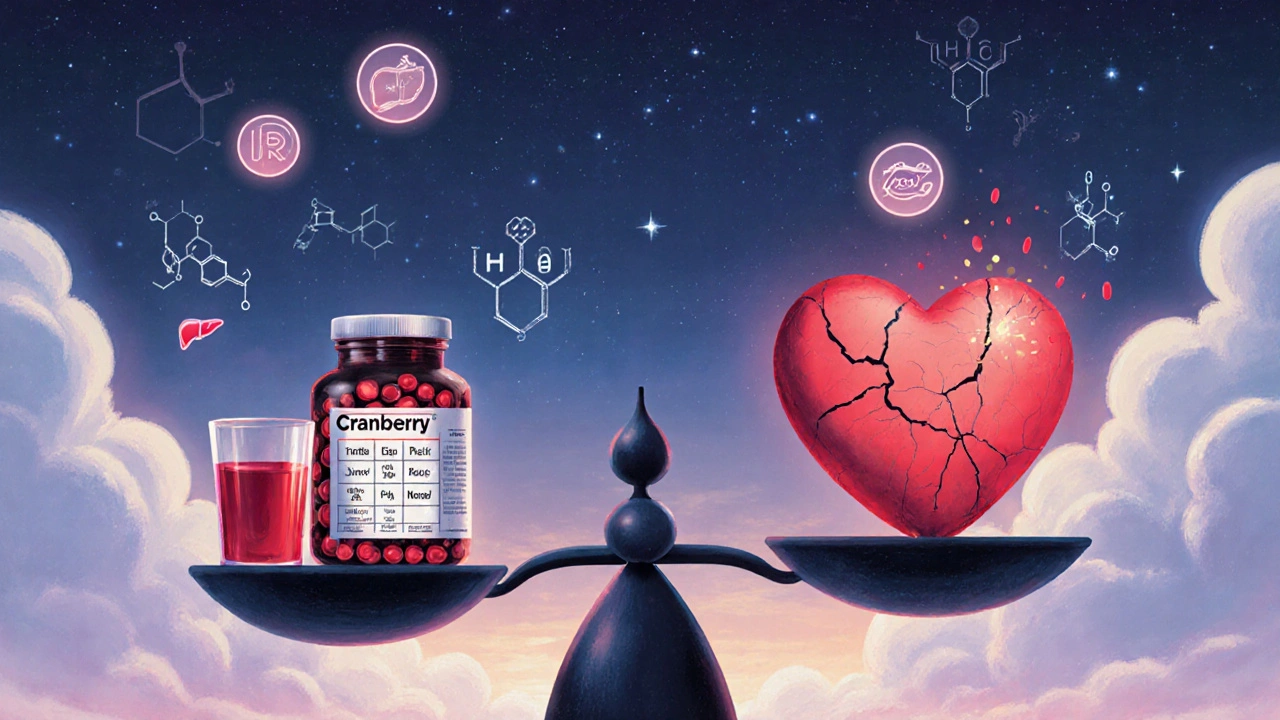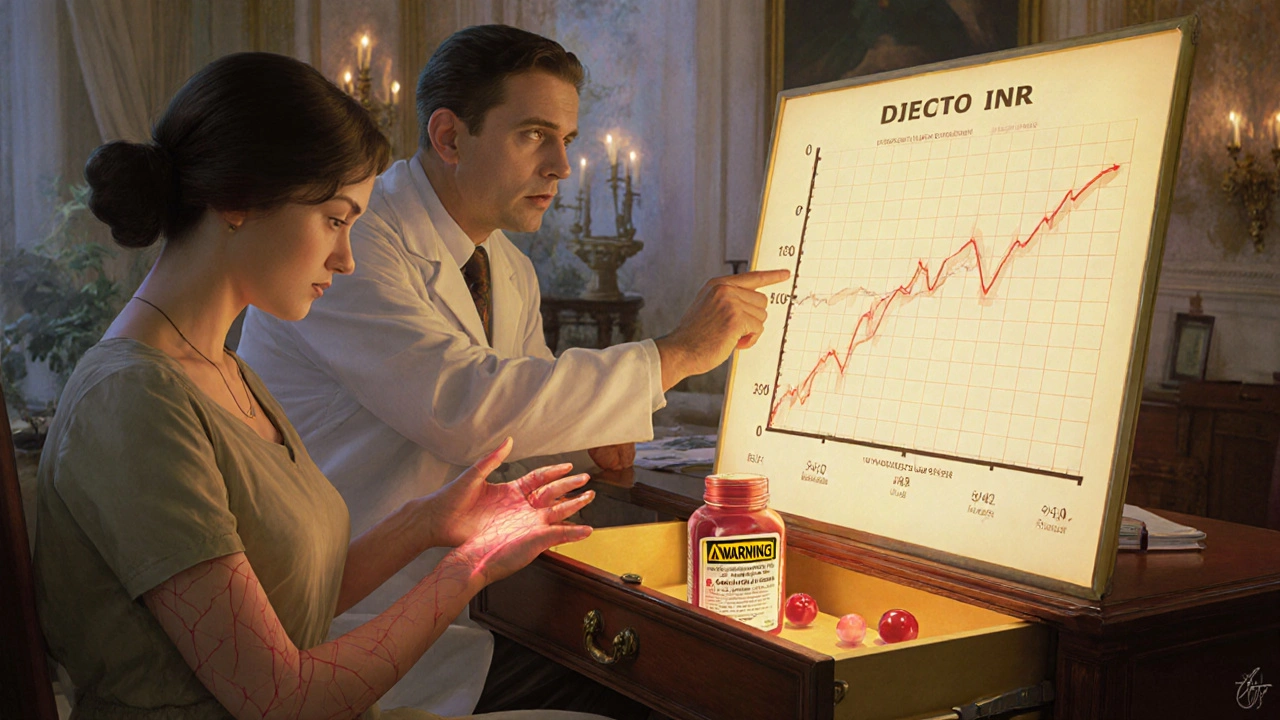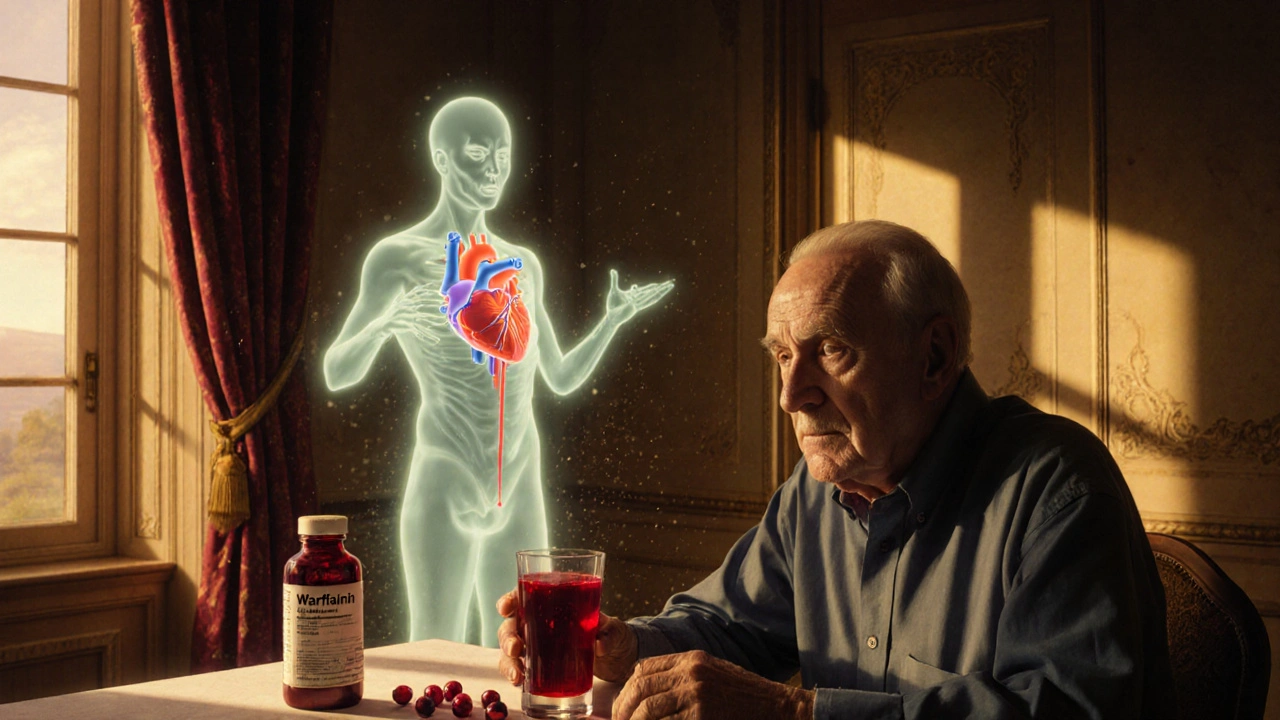If you're taking warfarin, a common blood thinner, and you love cranberry juice or take cranberry supplements for urinary health, you could be putting yourself at risk-without even realizing it. This isn't a myth or a warning from an overcautious doctor. It's a documented, potentially life-threatening interaction that has sent people to the emergency room with internal bleeding. The problem? Cranberry products can make warfarin work too well, pushing your INR levels into dangerous territory.
What Happens When Cranberry Meets Warfarin
Warfarin is a medication that keeps your blood from clotting too easily. It's prescribed for people with atrial fibrillation, deep vein thrombosis, or mechanical heart valves. But it’s tricky. Too little, and you risk a stroke or clot. Too much, and you risk bleeding inside your brain, gut, or elsewhere. The goal is to keep your INR (International Normalized Ratio) between 2.0 and 3.0. That’s the sweet spot. Cranberry products-whether it’s juice, capsules, or extracts-can push that number up, sometimes dramatically. Case after case shows patients with stable INR levels suddenly jumping to 5, 6, even 12. One 78-year-old man in Los Angeles was taking 45 mg of warfarin per week and drinking half a gallon of cranberry-apple juice every week. His INR soared to 6.45. He didn’t feel sick until he started vomiting blood. That’s not rare. It’s been reported in medical journals, patient forums, and government safety databases. The reason? Cranberries contain compounds like quercetin and other flavonoids that block an enzyme in your liver called CYP2C9. This enzyme is responsible for breaking down the active part of warfarin. When it’s slowed down, warfarin builds up in your bloodstream. You’re essentially overdosing on your own medication, even if you haven’t changed your dose.How Much Cranberry Is Too Much?
You might think, “I only drink a small glass a day.” But the problem isn’t always about quantity. It’s about consistency and concentration. - A single 240 mL glass of cranberry juice daily has triggered INR spikes in sensitive individuals. - Some cases involved cranberry capsules-just one or two per day. - Even cranberry-flavored sodas or sweetened juice cocktails have caused issues, likely because they contain more concentrated extracts than plain juice. The FDA flagged this interaction back in 2005 and required all warfarin labels to warn about cranberry products. Since then, agencies in Canada, New Zealand, and Europe have echoed the same warning. The New Zealand Centre for Adverse Reactions Monitoring received 33 reports of warfarin interactions with food or supplements in 2022 alone-and cranberry was a major player. One Reddit user wrote: “My INR went from 2.4 to 4.1 in one week after starting daily cranberry juice for UTI prevention. My hematologist said: ‘Stop it. Now.’” Another said: “I’ve taken cranberry pills for five years with no issues.” So why the difference? Because genetics matter. Some people naturally have a slower version of the CYP2C9 enzyme due to their DNA. If you carry the CYP2C9*2 or CYP2C9*3 variant, cranberry can boost your warfarin levels two to three times more than in someone without it. That’s why some people crash into danger while others don’t.What Forms of Cranberry Are Dangerous?
It’s not just juice. Every form of cranberry product carries risk:- Cranberry juice - Even 100% pure juice, not just sweetened blends.
- Cranberry capsules or tablets - Often contain concentrated extracts, sometimes more potent than juice.
- Cranberry extract supplements - Marketed for “urinary tract health,” but unregulated and unpredictable.
- Cranberry-flavored drinks - Soda, sports drinks, or flavored waters may contain enough active compounds to matter.
- Dried cranberries - Less likely, but still possible if consumed in large amounts daily.

What If You’ve Already Been Drinking Cranberry Juice?
If you’ve been consuming cranberry products and are on warfarin, here’s what to do:- Stop immediately. Don’t wait for symptoms.
- Call your doctor or anticoagulation clinic. Ask for an INR test within 3-5 days.
- Don’t restart without approval. Even if your INR returns to normal, restarting cranberry could trigger another spike.
- Keep a food and supplement log. Write down everything you eat or take daily. Bring it to every appointment.
Alternatives to Cranberry for UTI Prevention
If you’re taking warfarin because of atrial fibrillation or another condition, and you’re also prone to urinary tract infections (UTIs), you need a safe alternative to cranberry. Here are three proven options:- Methenamine hippurate - A non-antibiotic that turns into formaldehyde in the urine, killing bacteria. Safe with warfarin.
- Low-dose antibiotics - Like nitrofurantoin or trimethoprim (used cautiously, as some antibiotics interact with warfarin too).
- Hydration and hygiene - Drink water, urinate after sex, wipe front to back. Simple, effective, and zero interaction risk.
Why Do Some People Say It’s Fine?
You’ve probably heard, “My grandma drank cranberry juice for 20 years on warfarin and never had a problem.” Or you read a study that found “no significant interaction.” Here’s the truth: the evidence is messy. Some small clinical trials didn’t find a strong link. Why? Because they used small doses, short durations, or participants who didn’t have the genetic variants that make them sensitive. They also didn’t test concentrated extracts-only juice. Dr. David Flockhart, a leading pharmacologist, explained it well: “The inconsistency comes from differences in product strength, how often people drink it, and their genes.” Case reports are clear. Real people bleed. Real people end up in the hospital. That’s why agencies like the FDA and Medsafe don’t wait for perfect studies. They act on what’s already killing people.
What Should You Do Today?
If you’re on warfarin:- Stop all cranberry products now. Even if you think you’re fine.
- Ask your doctor for an INR check. Especially if you’ve had cranberry in the last two weeks.
- Read supplement labels. Many don’t list “cranberry” clearly-look for Vaccinium macrocarpon or “cranberry extract.”
- Teach your family. Your spouse, caregiver, or adult child should know this risk. They might be the one who buys the juice.
- Don’t assume ‘natural’ means safe. Natural doesn’t mean harmless. Cranberry is a powerful bioactive substance.
- Ask every warfarin patient: “Do you drink cranberry juice or take cranberry pills?”
- Don’t assume they’ll volunteer this information.
- Give them printed handouts from the American Heart Association or Merck Manual.
- Recommend alternatives for UTI prevention.
What About New Blood Thinners?
Many people are switching from warfarin to newer drugs like apixaban (Eliquis), rivaroxaban (Xarelto), or dabigatran (Pradaxa). These are called DOACs-direct oral anticoagulants. Good news: cranberry doesn’t interact with DOACs the same way. There’s no evidence they affect CYP2C9, and most studies show no increased bleeding risk. But here’s the catch: you can’t just switch. Your doctor decides if you’re a candidate. DOACs aren’t right for everyone-especially people with mechanical heart valves or severe kidney disease. If you’re on warfarin, you’re still in the majority. In 2023, about 2.5 million Americans still used warfarin. That’s a lot of people at risk. And even if you’re on a DOAC, don’t assume you’re safe forever. Research is ongoing. If you’re on warfarin, you need to act now.Can I have cranberry juice once in a while if I’m on warfarin?
No. Even occasional use can cause unpredictable spikes in your INR. The risk isn’t worth it. There’s no safe threshold established, and your body’s response can change over time. Avoid all cranberry products completely.
How long does it take for cranberry to affect my INR?
INR levels can rise within 3 to 7 days after starting cranberry products. In some cases, it’s as fast as 2 days. If you stop, it usually takes 5 to 7 days for your INR to return to normal. Don’t wait for symptoms-get tested.
Are cranberry supplements safer than juice?
No. Supplements often contain concentrated extracts that may be more potent than juice. They’re also less regulated, so you don’t know how much active compound you’re getting. Both carry the same risk.
What should I do if I accidentally drank cranberry juice?
Stop drinking it immediately. Call your anticoagulation clinic or doctor and ask for an INR test within 3-5 days. Do not change your warfarin dose on your own. Most INR spikes reverse on their own once cranberry is stopped.
Do other berries interact with warfarin?
Blueberries, blackberries, and strawberries don’t have the same documented risk as cranberry. However, they contain vitamin K and other compounds that can affect blood thinners. Stick to consistent, moderate amounts of any fruit. Avoid large, sudden changes in your diet.

Linda Rosie
November 22, 2025 AT 16:44Stop cranberry juice. Now. I’ve seen three patients bleed out because they thought ‘natural’ meant safe.
Vivian C Martinez
November 22, 2025 AT 19:44This is such an important post. So many people don’t realize how subtle interactions can be deadly. I’ve shared this with my entire book club - we’re all on warfarin or have family members who are. Thank you for the clarity and the alternatives.
Ross Ruprecht
November 24, 2025 AT 02:18Ugh, another ‘avoid everything’ medical scare. I’ve had cranberry juice every morning for 15 years. My INR’s been 2.8 forever. You’re telling me I should quit because of some FDA warning? Come on.
Bryson Carroll
November 24, 2025 AT 14:47People are idiots. You think your grandma’s ‘natural remedy’ is magic? CYP2C9 isn’t a suggestion it’s a metabolic pathway you’re either genetically equipped for or you’re a walking hemorrhage waiting to happen. Stop blaming the medicine blame your own ignorance
Jennifer Shannon
November 26, 2025 AT 10:28It’s fascinating - and terrifying - how something so seemingly innocent, like a glass of cranberry juice, can become a silent saboteur inside the body. I’ve spent years studying herbal pharmacology, and what strikes me most is how cultural norms blind us: cranberry is marketed as ‘health,’ not ‘potent bioactive compound.’ We don’t question it because it’s red, sweet, and sold in the juice aisle next to orange juice. But biochemistry doesn’t care about marketing. It only cares about enzyme inhibition, genetic variants, and cumulative exposure. And when you combine that with the fact that many older adults are on multiple meds, with limited access to regular INR testing, you’ve got a perfect storm. It’s not just about avoiding cranberry - it’s about rethinking how we approach ‘wellness’ in the first place. Is it about evidence? Or about comfort? We need better education, not just warnings.
Suzan Wanjiru
November 26, 2025 AT 22:14My dad was on warfarin and drank cranberry juice for years. Never had an issue. But he also had the CYP2C9*1/*1 genotype. Genetics matter. Get tested if you’re worried. Also methenamine works great for UTIs - no interaction. I’m a nurse and I tell all my patients this.
Kezia Katherine Lewis
November 28, 2025 AT 20:57From a clinical pharmacology standpoint, the CYP2C9-mediated inhibition by cranberry flavonoids is well-documented in vitro and in case series. The variability in phenotypic expression is attributable to polymorphic alleles, particularly CYP2C9*2 and *3, which reduce enzyme activity by 30-80%. The clinical significance is amplified in elderly patients with polypharmacy and reduced hepatic clearance. Therefore, the recommendation to avoid all forms of Vaccinium macrocarpon is not merely precautionary - it is evidence-based. Consider patient-specific pharmacogenomic testing if available.
Manjistha Roy
November 30, 2025 AT 04:03Thank you for this. I’m from India and we don’t have cranberry here, but I’ve seen so many people in the US take supplements without knowing the risks. This is the kind of information that should be in every clinic, not buried in a Reddit post. Please keep sharing these truths.
Jennifer Skolney
November 30, 2025 AT 09:52Just stopped my cranberry pills after reading this. 😅 Thank you for the clear alternatives - methenamine is now on my list! Also, I told my mom who’s on warfarin - she thought it was ‘just juice.’ Now she’s switching to blueberries. 💚
JD Mette
November 30, 2025 AT 10:11I appreciate how thorough this is. My uncle had a GI bleed last year - they never connected it to the cranberry tea he drank every night. It took three hospital visits. I’m sharing this with my family. Quietly. Gently. Because people need to hear it without feeling blamed.